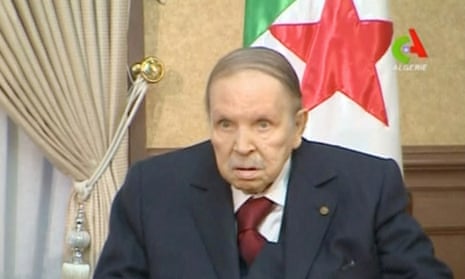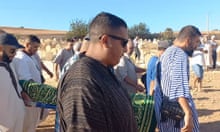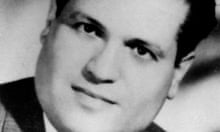Algerian protesters have vowed to continue their uprising after the president, Abdelaziz Bouteflika, bowed to weeks of mass demonstrations and resigned, abruptly ending two decades in power.
The 82-year-old leader announced his resignation on Tuesday night in a brief message that said he had “notified the president of the constitutional council of his decision to end his mandate”.
His resignation triggered a 90-day caretaker presidency by the chairman of the upper house of parliament, Abdelkader Bensalah, until elections are held. But Bensalah assuming the leadership is unlikely to satisfy protesters, and further demonstrations are expected on Friday.
“People don’t like him. The president of the senate won’t be accepted by the Algerian people,” said one protester, Zellag Lamine, in Algiers, adding: “I don’t feel good about how these elections will unfold.”
Algerians took to the streets of the capital on Tuesday night, waving flags and chanting in celebration at Bouteflika’s departure.
“This feels new. Personally, this will be the first new president I’ve experienced,” said N.A., a 20-year-old student from Algiers, who took part in the protests calling for Bouteflika’s overthrow. “I’m happy, I’m excited and I’m scared. But most importantly, I’m determined. This is just a first step. We’ll keep going until we have fair, transparent elections and a new government.”
The end of Bouteflika’s 20-year reign marked a new victory for popular protest in the region. But what will happen next is unclear in a country that has rarely seen political changes at the top since gaining independence from France in 1962.
Peaceful demonstrators had taken to the streets every Friday since 22 February, their numbers sometimes in the hundreds of thousands. In just under six weeks, they had forced Bouteflika to cancel his bid for a fifth term in office and relinquish power.
Pressure had also mounted on the leader from within his own regime, and the head of Algeria’s military, Ahmed Gaïd Salah, had called for Bouteflika’s immediate departure on Tuesday. “There is no more room to waste time … We decided clearly … to stand with the people so all their demands get fulfilled,” declared Salah.
Other powerful figures, including the former prime minister Ahmed Ouyahia, had also joined the calls for Bouteflika to go.
Salah argued that a statement issued by Bouteflika’s office on Monday declaring he would step down before his mandate officially ended on 28 April was written by “unconstitutional and unauthorised parties”, pitting him against the opaque clique around Bouteflika, believed to be ruling in his place.
The departing president suffered a stroke in 2013 and has rarely been seen in public since. His brother Saïd was widely believed to have been running the country from behind the scenes, aided by a cabal of sympathisers known as Le Pouvoir.
But as the growing protests emboldened demonstrators, they began to demand more than just the overthrow of Bouteflika. “It’s very clear that the ambitions of the protesters have grown over the past weeks. While this is definitely a significant victory, it’s not going to be enough,” said Chloe Teevan, a Maghreb specialist at the European Council on Foreign Relations.
Hamza Zait, a journalist and political scientist in Algiers, agreed that protesters would only be temporarily satisfied with Bouteflika’s departure.
“At the start people were just saying no to his fifth term, but then they demanded more,” he said. “There are people saying this is victory, but there are others saying it’s not sufficient. The system can’t change in a week, we need years for a real change.”
“This is just the tip of the iceberg,” said Yasmine Bouchene of the collective Les Jeunes Engagés (Activist Youth). “The demands didn’t change. We want them all gone. People are in downtown Algiers, celebrating this miniature victory, while also chanting that it’s just the beginning.”
This article was amended on 18 April 2022 to remove some personal information.










